| 2/28 | Kamy Akhavan, Executive Director, USC Center for the Political Future Brandon Kramer, Director, The First Step Lance Kramer, Producer, The First Step |
||||
| 3/1 | Pete White, Executive Director, LA CAN | ||||
| 3/2 | Noreen McClendon, Exec. Director of Concerned Citizens of South Central Los Angeles Terrall Tillman, Author of Formula For Success – Reentry 030 |
Oscar Doc Features – A HOUSE MADE OF SPLINTERS, NAVALNY & ALL THAT BREATHES
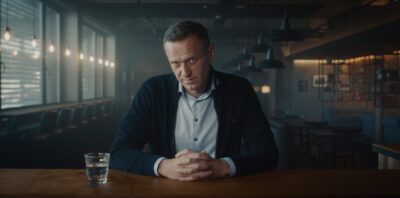
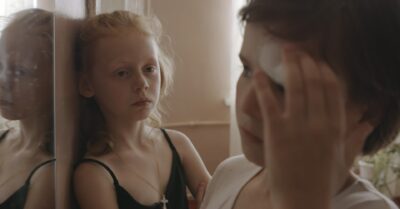
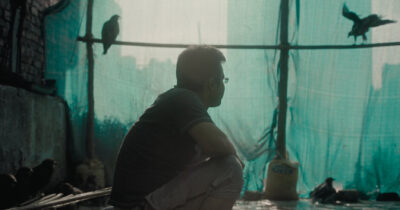
“A startling and uneasy wonder,” RETURN TO SEOUL opens at the Royal this Friday, March 3 in Glendale.
“Davy Chou’s Return to Seoul quickly blooms as a study in contrasts, sublimely juxtaposing character and culture.” ~ Chris Barsanti, Slant Magazine
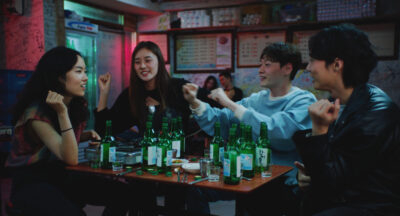
“Few movies have ever been more perfectly in tune with their protagonists than Davy Chou’s jagged, restless, and rivetingly unpredictable Return to Seoul.” ~ David Ehrlich, indieWire
“Strange, deep, changeable and wise.” ~ Jessica Kiang, Variety
“Davy Chou’s bittersweet comedy of a Korean adoptee searching for her biological parents is powered by a dazzling lead performance.” ~ David Jenkins, Little White Lies
Brevity is the soul of wit: The 2023 Oscar-nominated short films open February 17.
One good thing about the Oscars is the attention they bring a genre otherwise confined to film festivals: the short. As well as being enjoyable in their own right, they’re cheaper for budding filmmakers to make and so often democratic springboards to feature filmmaking. François Truffaut, Stanley Kubrick, and Christopher Nolan all got their starts making shorts. Some excellent recent features that started out as shorts include Whiplash, The Babadook, Martha Marcy May Marlene, and Half Nelson. All of which is to say that for the 18th consecutive year, we’ll start screening the animated and live action Oscar nominees next Friday at the Claremont, Glendale and NoHo and the documentary shorts at the Royal!
The documentary nominees are:
The Elephant Whisperers – India, 41 min. Director: Kartiki Gonsalves
Producers: Guneet Monga, Achin Jain
Synopsis: The Elephant Whisperers follows an indigenous couple as they fall in love with Raghu, an orphaned elephant given into their care, and tirelessly work to ensure his recovery and survival.
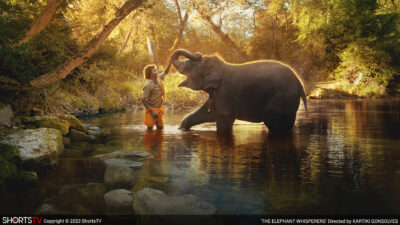
Haulout – UK, 25 min. Directors: Evgenia Arbugaeva, Maxim Arbugaev
Producers: Evgenia Arbugaeva, Maxim Arbugaev
Synopsis: On a remote coast of the Siberian Arctic in a wind-battered hut, a lonely man waits to witness an ancient gathering. But warming seas and rising temperatures bring an unexpected change, and he soon finds himself overwhelmed.
How Do You Measure a Year? – USA, 29 min. Director: Jay Rosenblatt
Producer: Jay Rosenblatt
Synopsis: For 17 years, filmmaker Jay Rosenblatt filmed his daughter Ella on her birthday in the same spot, asking the same questions. What results is a unique chance to watch time, to see a young woman come into focus physically, mentally and emotionally.
The Martha Mitchell Effect – USA, 39 min. Directors: Anne Alvergue, Debra McClutchy
Producers: Beth Levison, Judith Mizrachy
Synopsis: She was once as famous as Jackie O. And then she tried to take down a President. The Martha Mitchell Effect is an archival documentary portrait of the unlikeliest of whistle-blowers: Martha Mitchell, a Republican cabinet wife who was gas-lighted and at one point literally drugged by the Nixon Administration to keep her quiet. It offers a female gaze on Watergate through the voice of the woman herself.
Stranger at the Gate – USA, 30 min. Directors: Joshua Seftel
Producers: Joshua Seftel, Suzanne Hillinger, Conall Jones
Executive Producer: Malala Yousafzai
Cast: Bibi Bahrami, Saber Bahrami, Richard “Mac” McKinney, Emily McKinney, Dana McKinney & Jomo Williams
Synopsis: After 25 years of service, a U.S. Marine filled with hatred for Muslims plots to bomb an Indiana mosque. When he comes face to face with the immigrants he seeks to kill, the story takes a shocking twist toward compassion, grace, and forgiveness.
The animated nominees:
The Boy, the Mole, the Fox and the Horse – UK, 35 min. Directors: Peter Baynton, Charlie Mackesy
Producers: Cara Speller, Matthew Freud, Hannah Minghella and J.J. Abrams
Executive Producers: Jony Ive and Woody Harrelson
Synopsis: The Boy, the Mole, the Fox and the Horse is a story of kindness, courage, and hope in traditional hand-drawn animation, following the unlikely friendship of the title characters as they journey together, in the boy’s search for home. Based on the book of the same name.
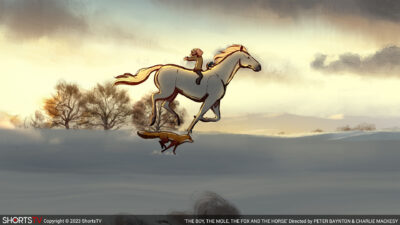
The Flying Sailor – Canada, 7 min. Directors: Amanda Forbis, Wendy Tilby
Producer: David Christensen
Synopsis: In 1917, two ships collided in the Halifax Harbour, causing the largest accidental explosion in history. Among the tragic stories of the disaster is the remarkable account of a sailor who, blown skyward from the docks, flew a distance of two kilometers before landing uphill, naked and unharmed. The Flying Sailor is a contemplation of his journey.
Ice Merchants – Portugal/France/UK, 14 min. Director: João Gonzalez
Producer: Bruno Caetano
Synopsis: Every day, a father and his son jump with a parachute from their vertiginous cold house, attached to a cliff, to go to the village on the ground, far away where they sell the ice they produce daily.
An Ostrich Told Me the World is Fake and I Think I Believe It – Australia, 11 min. Director: Lachlan Pendragon
Producer: Griffith Film School
Synopsis: When a young telemarketer is confronted by a mysterious talking ostrich, he learns that the universe is in stop motion animation. He must put aside his dwindling toaster sales and focus on convincing his colleagues of his terrifying discovery.
My Year of Dicks – USA, 25 min. Director: Sara Gunnarsdóttir
Writer: Pamela Ribon
Producer: Jeanette Jeanenne, FX PRODUCTIONS
Synopsis: An imaginative fifteen year-old is stubbornly determined to lose her virginity despite the pathetic pickings on the outskirts of Houston in the early ’90s. Created by Pamela Ribon from her critically acclaimed memoir.
The live action nominees:
An Irish Goodbye – UK, 23 min. Directors: Tom Berkeley, Ross White
Producers: Tom Berkeley, Ross White, Pearce Cullen
Synopsis: On a farm in rural Northern Ireland, estranged brothers Turlough and Lorcan are forced to reunite following the untimely death of their mother.
Ivalu– Denmark, 16 min. Director: Anders Walter
Producers: Rebecca Pruzan / Kim Magnusson
Synopsis: Ivalu is gone. Her little sister is desperate to find her. Her father does not care. The vast Greenlandic nature holds secrets. Where is Ivalu?
Le Pupille – Italy, 37 min. Director: Alice Rohrwacher
Producers: Alfonso Cuarón, Carlo Cresto-Dina, Gabriela Rodriguez
Cast: Alba Rohrwacher, Valeria Bruni Tedeschi, Melissa Falasconi
Synopsis: From writer and director, Alice Rohrwacher, and Academy Award® winning producer, Alfonso Cuarón, Le Pupille is a tale of innocence, greed and fantasy. This live action short is about desires, pure and selfish, about freedom and devotion, and about the anarchy that is capable of flowering in the minds of girls within the confines of a strict religious boarding school at Christmas.
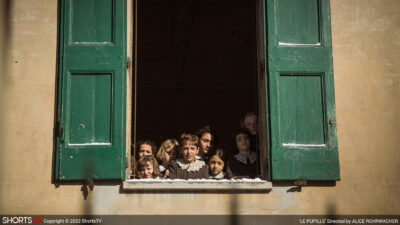
Night Ride – Norway, 15 min. Director: Eirik Tveiten
Producer: Gaute Lid Larssen, Heidi Arnesen
Synopsis: It is a cold night in December. As Ebba waits for the tram, an unexpected turn of events transforms the ride home into something she was not expecting.
The Red Suitcase – Luxembourg, 17 min. Director: Cyrus Neshvad
Producer: Cyrus Neshvad
Synopsis: An Iranian girl decides to remove her hijab in a life-changing situation.
“A work of handcrafted beauty,” THE BLUE CAFTAN opens February 10 at the Royal.
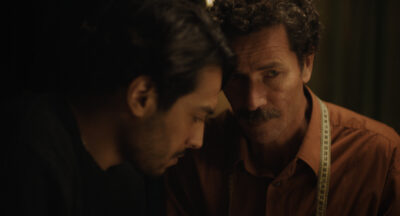
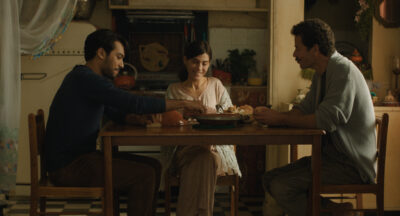
Moviegoers, start your guesses: The Umpteenth Annual Laemmle Oscar Contest has begun.
The Oscar nominations are out, and in spite of the fact that Hallelujah, Nope, RRR and Decision to Leave, Dolly De Leon, Viola Davis, Paul Dano, and Danielle Deadwyler were inexplicably excluded, at least Brian Tyree Henry and Judd Hirsch were honored. Anyway, it’s time for our Umpteenth Annual Laemmle Oscar Contest! If you, dear moviegoer, can accurately predict how the members of the Academy of Motion Picture Arts & Sciences will vote in all 23 categories, (or close to it), you will win movie passes good at all Laemmle venues! The 95th Academy Awards take place on Sunday, March 12 and we’ll announce the winners soon afterwards. Good luck!
The Top Ten Films of 2022 contest results are in!
And the Top Ten Customer-Chosen films of 2022, in order from 1 to 10, are [drum roll]:
- Everything Everywhere All at Once
- The Banshees of Inisherin
- TÁR
- The Fabelmans
- RRR
- Top Gun: Maverick
- Nope
- Aftersun
- Triangle of Sadness
- Decision to Leave
It’s a terrific list, arguably better than the one AMPAS announced this week, which excluded RRR, Nope, Aftersun and Decision to Leave. Films 2-4 and 9, hyperlinked for your convenience, are still in theaters!
Top Ten Films of 2022 contest ends Sunday: Tell us your favorites for a chance to win free movie passes!
Keep those Top Ten contest entries coming. You have until this Sunday, January 22 to give it some thought and enter here. So far, unsurprisingly, it looks like many Laemmle moviegoers are kvelling about Everything Everywhere All at Once, Top Gun: Maverick, and RRR. We’ll have final results next week. You can read Greg Laemmle’s list and leading American film critics’ lists if you need inspiration. Personally, my favorite is Jordan Peele’s spectacular Nope. No doubt my reaction was influenced by the fact that I saw it in a packed, sold-out theater on opening night, because movies are better in theaters!
- « Previous Page
- 1
- …
- 21
- 22
- 23
- 24
- 25
- …
- 100
- Next Page »
